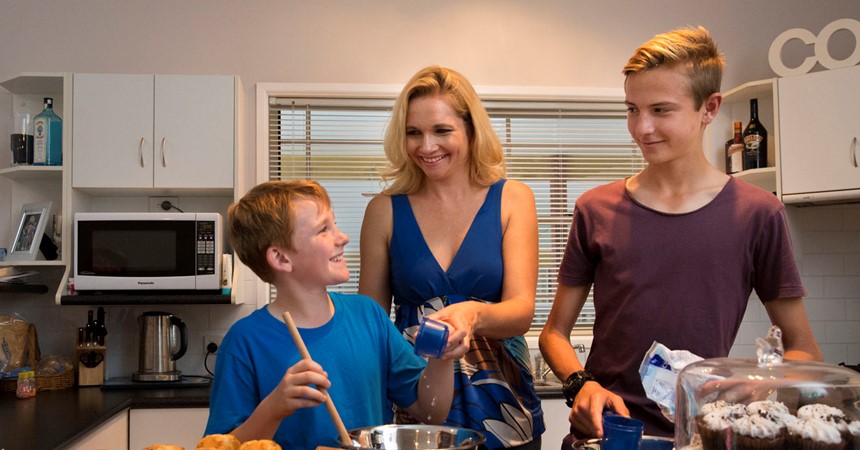Photos of children adorned the walls, soft music played and I was offered a cup of tea. As we settled down for a conversation on the brown chesterfield lounges, I instantly sensed why my colleagues hold Marg in such high esteem.
You see, amongst other things Marg is a foster carer, and has been for 32 years. In that time, she and her family have provided care to over 150 children.
The phrase ‘down to earth’ comes instantly to mind to describe Marg. Despite her generous spirit, she insists she is no one special and shies away from the praise she often receives for the ‘work’ that she does.
Instead, Marg views herself as an everyday person who enjoys yoga, cooking and gardening.
During my visit, Marg took time to explain how the foster care had evolved over the past three decades, her face beaming as she spoke positively about the increased availability of early intervention services to prevent family breakdowns.
She went on to explain how her personal views had evolved in line with industry best practice, stating that she believes restorations between birth parents and their children are the pinnacle.
“In the 32 years I have been a carer, I have provided short term, long term, respite and emergency care. It doesn’t matter what type of care you provide, you have to be in it for the right reasons,” Marg said.
Curious about what she meant, I probed a little further. "What are the ‘right’ reasons?" I asked.
“A willingness to provide love and a nurturing environment, where you can raise a healthy child for their birth parents until they are able to take care of them, or where required, a long term foster family,” she answered.
Marg’s support of restoration between birth parents and children underpins much of our conversation. Whilst she knows it is not always achievable or in the child’s best interest, in her current capacity as an emergency carer to newborns, she believes it is important birth parents have hope that they will see their children again.
“Out of respect for the children I have learnt not to ask about why a child has come into my care as it will always be through an unfortunate set of circumstances. Being a carer does not mean I am perfect and certainly does not give me the right to judge. The best thing that I can do, and the only thing that I should be doing, is caring for the children until their parents are equipped with the tools, knowledge and support to raise them, themselves. Knowing the back story can cloud judgement and is non-constructive. It’s been a long road for me to come to that conclusion, but doing so has been hugely beneficial.”
Admittedly, Marg’s views caught me a little off guard. I asked, ‘Do you like to know anything about the birth parents for the sake of the children?’
“Yes, of course, in a way that is constructive for both the birth parents and children. As a parent I identify with them and like to assure them that I will take good care of their children until they are able to do so or until they are placed in a long term care arrangement. Some parents are open to this contact, others aren’t, and I respect their decision whatever they choose. If I do meet them I do not focus on the past; as I said, that is none of my business. Rather, I encourage them to tell me about their hopes for their children’s future. I share with them a journal I keep on each child that comes into my care and update them on any important milestones. I will always favour meeting the parents as my experience has taught me that it helps to break down barriers and understand the family makeup. Even with newborns I like to talk to the children about their birth parents to help establish the family bond.”
It is clear that family means a great deal to Marg, whether it be the families of the children she cares for, or her own.
When I asked Marg about the impact being a foster carer had had on her own family, there was no hesitation in describing the many benefits. Marg was keen to acknowledge the ongoing support of her husband, Ron and two adult sons, who she said provided a team approach to care since they first walked through CatholicCare’s (formerly CentaCare) doors all those years ago.
When Marg and Ron first took children into their care, their two biological sons were only 4 and 5. She described how one of her greatest joys has been to watch the men in her life grow and care for children who have come and gone from their home over the years. Marg went on to say that she now gets to share in that same sense of delight all over again, when watching her grandchildren interact with children in their care.
Just as our conversation is coming to a close, 12-week old baby Charlotte* wakes from her sleep. Marg attends to her needs, making her a bottle, smiling at her and rubbing her back. Charlotte is dressed in a gorgeous pink knitted cardigan.
Instantaneously I recall my own experiences as a mother of a newborn, and the contrast is stark. Marg makes taking care of an infant look effortless. I ask her if this is the case. She responds by saying like any form of parenting it requires a lot of patience, understanding and energy but that she finds it hugely rewarding.
I questioned Marg, who is now in her 50s, how long she and her husband Ron intend to keep providing care. With a smile on her face, she said they look forward to having intermittent breaks from care, so they can recharge (advice she says is important for all parents and carers), but that they have no plans to stop fostering and will continue to do so while they are physically able.
My time spent with Marg was inspiring and heart-warming. She is one of many carers. Each has an important story to tell and each one is changing the lives of many through generous deeds. Marg was hesitant about this story being told, as she did not want to be placed on a pedestal. I thank her for allowing me to do so, in the hope that it encourages more understanding of foster care in the wider community, recognition of the work she and other carers do and perhaps even inspires someone else to take on the role of foster carer.
More than 20,000 children throughout New South Wales are reliant on the foster care system. 49% of these children are right here in the Hunter Valley and they need your help. If you'd like to learn more about becoming a foster carer, join us for one of our information sessions. Click here to learn more.


